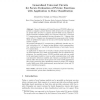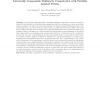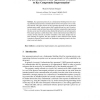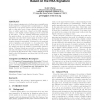71 search results - page 12 / 15 » LEGO for Two-Party Secure Computation |
IPPS
2005
IEEE
14 years 1 months ago
2005
IEEE
1 Electronic fair-exchange protocols have received significant attention from the research community in the recent past. In loose terms, the fair exchange problem is defined as at...
ICISC
2008
13 years 9 months ago
2008
Secure Evaluation of Private Functions (PF-SFE) allows two parties to compute a private function which is known by one party only on private data of both. It is known that PF-SFE c...
TCC
2009
Springer
14 years 8 months ago
2009
Springer
It is well known that universally composable multiparty computation cannot, in general, be achieved in the standard model without setup assumptions when the adversary can corrupt a...
EUROPKI
2006
Springer
13 years 11 months ago
2006
Springer
Abstract. Key agreement protocols are a fundamental building block for ensuring authenticated and private communications between two parties over an insecure network. This paper fo...
WWW
2005
ACM
14 years 8 months ago
2005
ACM
A fair contract signing protocol allows two potentially mistrusted parities to exchange their commitments (i.e., digital signatures) to an agreed contract over the Internet in a f...




